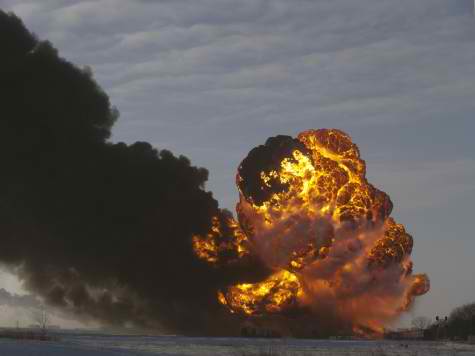The Contra Costa Times reports that a group of about 60 protesters representing the Communities for a Better Environment (CBE) held California’s first demonstration against what the group calls “bomb trains” that will be bringing as much as 1.3 million gallons of highly toxic and flammable crude oil through Richmond’s Kinder Morgan rail yard to be trucked to local refineries.
Despite lots of jeering and protesters holding up signs that said “Boom,” there were no injuries or arrests reported.
The protest comes after Chevron Oil Company’s billion-dollar oil refinery upgrade project, initially proposed almost a decade ago, reached a major milestone on March 21st when the city of Richmond released its more than 1100-page draft Environmental Impact Report (EIR) on a modernization and refinery expansion plan. With California oil production falling from 1.1 million barrels a day in 1990 to about 450,000 barrels a day currently, the EIR detailed plans to replace and expand Chevron’s hydrogen plant, which is more than 50 years old, and bring up to 250 oil-trains a year into California to offset falling state production.
The demonstrators at the Richmond railroad yards expressed their anger on Saturday at the Bay Area Air Quality Management District issuing a permit, without a public hearing, in February to Kinder Morgan to allow oil trains from the Bakken Field in North Dakota to deliver and transfer crude oil from rail tank cars onto trucks.
Yet what really seemed to be driving the protest is that the public comment period for the draft EIR on the Chevron refinery upgrade expired on May 2 and the City Council appears ready to green light the project.
The CBE activists are the apparent front group for the Asian Pacific Environmental Network, the Sierra Club and the Natural Resources Defense Council who filed a lawsuit in San Francisco Superior Court asking for a preliminary injunction against further crude oil operations at Kinder Morgan, as well as suspension of the air district permit, pending a full review under the California Environmental Quality Act. The Court has set a hearing date on July 18.
CBE and its allies in 2012 were able to delay Chevron after filing a lawsuit against the company’s original EIR, claiming the skies would darken and thousand people would suffer respiratory issues if there was an accident at the plant. Chevron agreed to “mitigate” any greenhouse gas emissions by including a new solar energy facility on Chevron property and an urban forestry program throughout the city. It also agreed that if any emissions increase were to occur, the refinery would purchase greenhouse gas allowances through the state’s cap-and-trade program.
The refinery project has huge support in the community from private sector construction and trade union workers that lost a substantial number of jobs when the project was halted in 2010. “It impacted families and children, and they suffered,” said Greg Feere, an officer of the Contra Costa Building Trades Union, according to a report by the San Francisco Chronicle. “This happened a month and a half before Christmas.”
Richmond Pastor Marcus Mitchell, on behalf of Plumbers and Steamfitters Local 342, added “The installation of more reliable equipment will ultimately improve community health and worker safety.” Union worker Antoine Cloy of Richmond agreed. “We’re tired of all the people in our community not working,” Cloy said, according to the Chronicle.
Tina Barbee, a spokeswoman for the Tesoro Golden Eagle refinery outside the neighboring city of Martinez, confirmed to the Times earlier this spring that their facility already receives between 5,000 and 10,000 barrels per day of Bakken crude, about two to three trains per month. Spokesmen for Kinder Morgan and the Bay Area Air Quality Management District in San Francisco declined to comment due to the lawsuit.
Andrés Soto, who is a lead organizer for CBE, told local reporter Doug Oakley that since he lives about a quarter of a mile away from the train tracks in Benicia, “What’s really scary is on the other side of these ‘bomb trains’ are schools and houses.”
Bradley Angel, executive director of Greenaction, which helped organize the protest, told Oakley that it’s simple: “Crude oil should stay in the ground.”
There has been an average one major accident in North America per month involving the derailing of an oil train over the last year due to Obama Administration’s delay in building the Keystone XL Pipeline. The worst accident was last summer’s oil train carrying Bakken crude that derailed, caught fire and killed 47 people in Lac-Megantic, Quebec, near the Maine border.
But with oil production taxes plummeting, the California State Legislature passed S.B. No. 4 in September to encourage a new fracking boom in the state. With energy projects cranking up, the Richmond protest against “bomb trains” is just the first of what promises to be a protracted battle over a slew of new carbon-based energy projects in the Golden State.

COMMENTS
Please let us know if you're having issues with commenting.